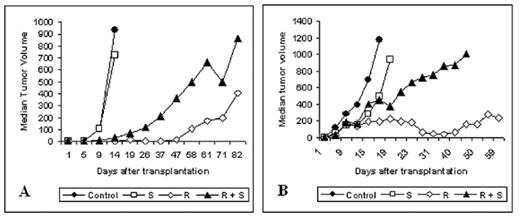Abstract
We previously reported an increase of tumor growth inhibition following chemotherapy combined with concomitantly administration of imatinib mesylate [
Decaudin D, et al. Int J Cancer 2005;113:849–856
; Decaudin D, et al. Anti-Cancer drugs 2006;17:685–696
; Decaudin D, et al. Impact of STI571 on the pharmacokinetics of etoposide and / or ifosfamide in mice. Cancer Res (AACR Annual Meeting) 2006;abstr:5154]. Inversely, combination of imatinib and rituximab was reported in very few cases of patients and remains controversial. In order to explore this particular combination of targeted therapies, we therefore investigated the in vivo impact of rituximab plus imatinib on a B-cell lymphoproliferation. Combination of the tyrosine kinase inhibitor imatinib mesylate (STI571) and the anti-CD20 monoclonal antibody rituximab was evaluated on an EBV-associated B-cell lymphoproliferative disorder xenografted into SCID or Rag2/gc −/− (B-, T-, and NK-) mice. Using SCID mice, we found that STI571 diminished the efficacy of rituximab to inhibit tumor growth in vivo (Figure 1A). Using alymphoid Rag2/gc −/− mice, we showed that the effect of STI571 was not dependent on the presence of NK cells (Figure 1B).In contrast, serum complement administered after STI571 treatment reversed this inhibitory effect. Finally, using non immunodeficient mice, we observed an in vivo decrease of CD4-positive T-cells and mature B-cell lymphocytes after imatinib administration. We found that STI571 decreased the in vivo efficacy of rituximab via serum protein components that could influence complement-dependent cytotoxicity. In contrast, this effect was not dependent on the presence of NK cells.
Author notes
Disclosure: No relevant conflicts of interest to declare.
2007, The American Society of Hematology
2007


This feature is available to Subscribers Only
Sign In or Create an Account Close Modal